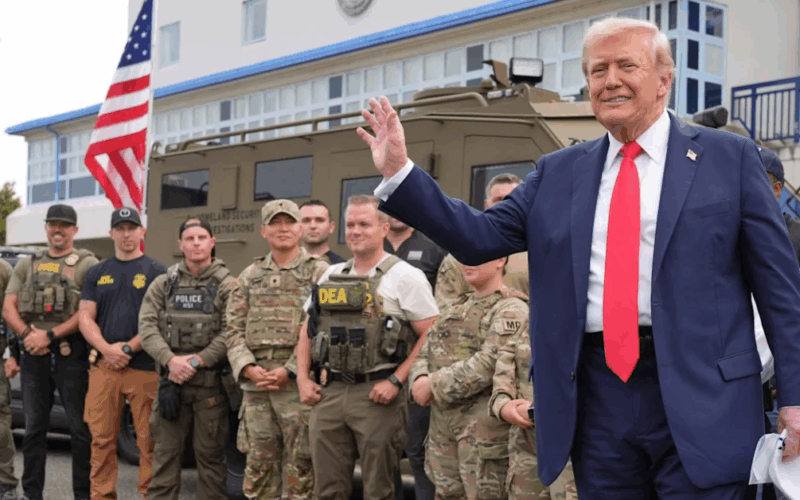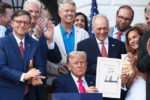Washington, D.C. – A recent poll reveals that a significant portion of Americans are backing President Donald Trump‘s controversial approach of deploying the military and National Guard to combat violent crime in major cities. The president’s decision to send troops into highly crime-stricken areas such as Washington, D.C., with plans for Chicago and New York City, has garnered considerable public attention and support.
The Associated Press-NORC survey highlights that over half of Americans, around 53 percent, approve of Trump’s crime crackdown initiatives. This marks an important shift in public opinion amid heightened concerns over urban violence, with a striking 80 percent of respondents identifying crime in large cities as a serious problem.
Strong Public Support for Military and National Guard Assistance
The poll reveals a clear majority of Americans consider it acceptable for the U.S. military and National Guard to assist local police in battling crime in major urban centers. Specifically, 55 percent of respondents are in favor of this collaborative approach. Nevertheless, only about one-third support the federal government taking direct control of city police departments.
- 53% back President Trump’s actions targeting violent crime.
- 55% find military and National Guard assistance in cities acceptable.
- 80% see urban crime as a serious concern.
- One-third support federal takeover of local police forces.
Rising Approval Ratings for President Trump Amid Crime Crackdown
The new crime enforcement measures have coincided with a rise in President Trump’s approval rating, according to the latest AP-NORC data. The president’s favorable rating surged by five points in the last month, reaching 45 percent, the highest in this poll series for both of his terms.
Additional polling from JL Partners in July showed a slightly higher approval of 49 percent, indicating growing support related to these policies.
Impact and Responses in Washington, D.C.
Attorney General Pam Bondi reported substantial progress in Washington, D.C., with 1,178 arrests and the seizure of 123 illegal guns during the ongoing push to improve safety. D.C. Mayor Muriel Bowser acknowledged the benefits of the increased law enforcement presence, citing carjackings have decreased by 87 percent.
“We greatly appreciate the surge of officers that enhance what MPD has been able to do in this city,” Mayor Bowser said. “When carjackings go down, use of guns goes down, and homicides or robberies decline, neighborhoods feel safer and are safer. This surge has been important to us.”
However, not all city leaders echoed this support. Councilmember Robert White Jr. expressed strong opposition, warning that this federal intervention was “not a good thing” and that residents were overwhelmingly against it. Similarly, Ward 1 DC Councilmember Brianne K. Nadeau described the city as “under siege” and criticized the erosion of D.C.’s limited autonomy.
Controversies and Political Reactions in Other Cities
Following the perceived success in D.C., President Trump indicated plans to send National Guard troops to other cities struggling with crime, including Chicago and New York. He labeled Chicago as “a mess” suffering under an “incompetent mayor”, vowing to intervene soon.
“If you hurt my people, nothing will stop me—not time or political circumstance—from making sure you face justice under our constitutional rule of law,” responded Illinois Governor JB Pritzker, highlighting the tension between state and federal officials over this strategy.
What’s Next in the Fight Against Urban Crime?
President Trump’s expanding military deployment strategy underscores a more aggressive federal response to crime in America’s largest cities. While public support remains strong, the approach has ignited debate among local officials and civil rights advocates concerned about federal overreach and community impacts.
As the administration prepares to potentially extend its National Guard deployments to Chicago and New York, the nation will closely watch both the effectiveness of these measures in reducing crime and the political ramifications of federal intervention in local policing.




